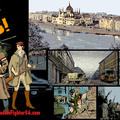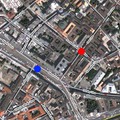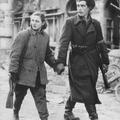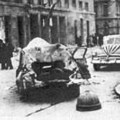.jpg) Most major English-language publications ran the story of the October 23 Budapest riots. Even the Khaleej Times had something to say: based in the United Arab Emirates, the paper wants "fresh elections" in Hungary. Kate Connolly reported for major Australian and British news organs from a safe distance, Bucharest, Romania, 900 kilometers from Budapest. Never mind, at least the Pope is with us.
Most major English-language publications ran the story of the October 23 Budapest riots. Even the Khaleej Times had something to say: based in the United Arab Emirates, the paper wants "fresh elections" in Hungary. Kate Connolly reported for major Australian and British news organs from a safe distance, Bucharest, Romania, 900 kilometers from Budapest. Never mind, at least the Pope is with us. The Economist: "A Bitter Farce"
"Imagine an American president celebrating the Fourth of July in front of the Capitol with a spattering of foreign guests and a few handpicked kids on bikes in a parody of a parade, with a solitary fire truck for good measure and no ordinary citizens closer than a mile."
Kommersant: "An Information War"
"By all appearances, the events early this week were the continuation of coordinated attacks by ring-wing forces against the ruling party and its leader Ferenc Gyurcsany. The campaign to discredit the prime minister has already yielded dividends for the opposition in the form of an impressive victory in the local elections. If Fidesz now succeeds in forcing the government to resign and holding early parliamentary elections, the right wing will be assured of its accession to power."
The Khaleej Times: "Back to the people"
"So what should have been a solemn occasion to remember a landmark event in Europe’s post World War II history has been turned into a massive anti-government agitation. […] Surely, a people who defied Soviet tanks and guns half a century ago cannot be cowed down by a lying and discredited politician. The only way to resolve the explosive situation in Hungary may be by way of fresh elections. It’s back to the people, then."
Sticking to the highest standards of objectivity in modern-day investigative journalism, Kate Connolly managed to report for the Sydney Morning Herald and The Daily Telegraph from a 900 kilometer distance: Bucharest, Romania. Here she goes:
Sydney Morning Herald: "Deja vu"
"In a dramatic visual recreation of scenes from 1956 when Red Army tanks tried to quash the revolution, a lone tank moved jerkily down a central Budapest street on Monday night, surrounded by excited protesters.[…] Their action turned what had been peaceful mass demonstrations into the worst political violence since the events of 1956."
And finally, even Pope Benedict himself had something to say, although he probably did not expect what was going to happen when he sent this message to Hungarian President László Sólyom:
The Pope: "Courageous People"
"Despite all the oppression they have endured down the centuries, most recently from Soviet communism, your people have always maintained the correct evaluation of the relationship between the State and citizens, beyond all ideology. […] The heartfelt wish that I now renew is that Hungary may build a future free from all forms of oppression and ideological conditioning."







Last comments